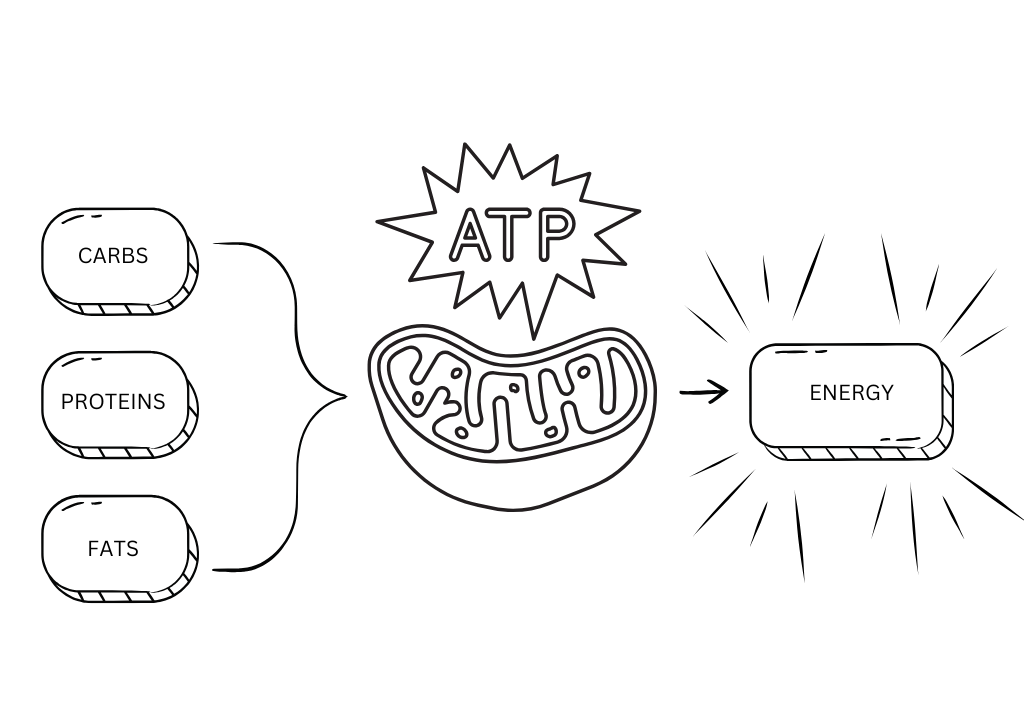Your cart is currently empty!
This is such a fascinating subject! At first glance, it seems straightforward—want more focus and energy? Just drink coffee!
You drink more and more coffee to get yourself into a state where you always have energy and focus, and just when you thought you won the game, you finally realize that coffee has little to do with it. Yet the pattern in our minds remains the same. Coffee = energy & focus.
Good news: even though you feel you didn’t win the lottery with coffee in achieving high energy and focus, there is a better way. All you need to do is uncover other amazing possibilities. Identify what your body is lacking, give it the right support, and watch your energy and focus return.
What is energy? Energy, scientifically speaking, is the capacity to do work. In our bodies, energy is primarily supplied from food. There is one important player here called ATP! Adenosine triphosphate (ATP) is an energy-carrying molecule found in the cells of all living things. ATP captures chemical energy obtained from the breakdown of food molecules and releases it to fuel other cellular processes.
What are stimulants, and why do they make you feel on top of the world? Stimulants, such as caffeine, increase cortisol and adrenaline levels, activating the central nervous system (CNS). This creates a temporary feeling of the presence of energy, but the effect is short-lived and can lead to crashes.
So, if you’re tired and reaching for another cup of delicious coffee to—and I get it—think twice. This is like a car slowing down due to low gas, and instead of refueling, you just keep pressing the gas pedal harder. Eventually, you might find yourself stranded on the side of the road, calling AAA for rescue.
At the same time, caffeine plays a crucial role in dopamine metabolism. Dopamine is key to focus and alertness, so coffee isn’t all bad. However, like any system in your body, your dopamine pathways need proper management. Your body is incredibly efficient at self-regulating, but having a basic understanding of these processes helps you avoid disruptions. Think of it like plumbing issues in your bathroom—you don’t need to know how your house’s plumbing system was built; it’s sufficient to just know that putting the wrong things down the drain will require a specialist to fix it later. Similarly, to sustain peak focus and energy, you need to understand some basics of this process and give your body what it needs while avoiding things that might cause dysfunction.
Okay, I’ve already given you a lot of information.
And now, let’s remember the key components of the body’s energy system:
- ATP production
- Mitochondrial health
- Hormonal balance
- Central Nervous System (CNS) regulation
- Cellular oxygenation and nutrient absorption
A deep description of every factor would require a whole book. I’d love to share with you information that you would actually need.
Before we go further, let’s address why you’re reading this post. Probably, you need more energy for your life. It’s important to distinguish between temporary fatigue and chronic fatigue—because they are not the same.
“In medical terminology, fatigue is the early onset of tiredness after an activity has been started; it is a sensation of exhaustion or difficulty in carrying out physical or intellectual activities, without recovery after a period of rest. Fatigue is categorized as recent fatigue (less than one month), prolonged fatigue (more than one month), and chronic fatigue (more than six months).” (1)
If you’re have just an occasional fatigue, you’re most likely in good health, your body should naturally bounce back during your solid sleep (seriously, get those good hours in), with real food that actually fuels you (yes, that means quality carbs, proteins, fats, and minerals—sorry, fast food and ultra-processed meals just won’t cut it, but more on that later), and with proper recovery time. When those bases are covered, on-demand recovery boosters become simple.
- Support your CNS balance with adaptogenic mushrooms and herbal extracts, such as ashwagandha, rhodiola, reishi, and lion’s mane.
- Stay hydrated with essential minerals, including macro, micro, and humic substances.
- Increase antioxidant intake with polyphenols like green tea, turmeric, dark chocolate, and cinnamon.
- Drink moderate amounts of high-quality coffee, preferably tested for mold.
- Take breathing breaks (5–10 minutes). Try this:
- Inhale for 5 counts, exhale for 5 counts. Repeat.
- Another option: Inhale for 4 counts, hold for 7, exhale for 8. Repeat.
Breathing properly signals your body to either rest or activate, optimizing energy usage. Many people unknowingly waste energy by holding tension and mimicking stress responses, which are exhausting.
Chronic Fatigue Syndrome (CFS) causes extreme, long-lasting exhaustion that doesn’t improve with rest and actually gets worse with physical or mental effort. It can make everyday activities impossible. CFS is often linked to imbalances in the body’s energy systems, affecting everything from muscle strength to brain function.
Interestingly, CFS is not actually a diagnosis—it’s a symptom of poor mitochondrial function. Mitochondria are the tiny engines in our cells that generate ATP, the body’s energy currency. When mitochondria fail, ATP production drops, slowing down all bodily functions, including focus and concentration. (2)

If you want to learn more about mitochondria and CFS, there are resources I can share. You can also get lab tests to determine if you have mitochondrial dysfunction and explore appropriate treatments.
Dr. Sarah Myhill, an expert in CFS, outlines a general guide to treatment:
- Pace yourself – Don’t use up energy faster than your mitochondria can supply it.
- Feed the mitochondria – Supply the raw materials needed for mitochondria to function and repair.
- Address the root causes of mitochondrial damage, including:
- Pacing activities to avoid excessive stress
- Prioritizing excellent sleep for mitochondrial repair
- Eating high-quality nutrition, including:
- A range of micronutrient supplements
- Stabilizing blood sugar levels
- Identifying and eliminating food allergies
- Detoxifying from heavy metals, pesticides, alcohol, tobacco, and other toxins that impair mitochondrial function
- Addressing hyperventilation, which can contribute to energy depletion
- Correct secondary damage caused by mitochondrial failure, such as immune disturbances, digestive issues, hormonal imbalances, and slow liver detoxification.
It would be good to note, if you’re just dealing with occasional fatigue, the general strategy is much simpler. That being said, the mitochondrial support approach can benefit everyone—so use it at your discretion.
References:
1: Avellaneda Fernández A, et al. Chronic fatigue syndrome: aetiology, diagnosis, and treatment. BMC Psychiatry. 2009.
2: Sarah Myhill, Diagnosing and Treating Chronic Fatigue Syndrome.


Leave a Reply